
 Throughout the year, package thefts occur on a fairly regular basis. But, as Christmas draws near and package delivery increases, so too do the thefts. While packages left on doorsteps and out in the open may seem to be easy targets for thieves, the consequences of getting caught are rarely considered. Would-be porch pirates should certainly think through their intended capers as many houses are equipped with doorbell cameras these days that capture clear video of any movement at or near the doorway.
Throughout the year, package thefts occur on a fairly regular basis. But, as Christmas draws near and package delivery increases, so too do the thefts. While packages left on doorsteps and out in the open may seem to be easy targets for thieves, the consequences of getting caught are rarely considered. Would-be porch pirates should certainly think through their intended capers as many houses are equipped with doorbell cameras these days that capture clear video of any movement at or near the doorway.
What Can Happen to Individuals Who Steal Packages?
Grinchy thieves can face stiff penalties for stealing packages. In Texas, theft is classified by the amount of property that is stolen. Depending on the amount of the items stolen, a person caught stealing packages can face anywhere from a Class C misdemeanor punishable by a fine of up to $500 up to a First Degree Felony facing 99 years or life in the penitentiary. The latter would require someone stealing an item worth more than $300,000. While this may be unlikely, a thief wouldn’t know what he or she is stealing until he opens up that box. In addition, if committed within the same criminal episode, the aggregate amount of the items stolen could increase the punishment ranges for the offense as well.
Theft Of Mail In Texas
In 2019, the Texas legislature passed another law aimed at package theft. HB 37 makes it a crime to steal mail (including packages) from mailboxes or homes. The punishment range of this new law is linked to the amount of homes from which mail is taken. If a person takes packages from fewer than 10 homes, the crime is a Class A misdemeanor; 11-30 homes is a State Jail Felony; and 31+ homes is a 3rd Degree Felony. Of course, if the value of the package would make the offense a higher felony, then the state could also choose to file a case for the greater offense.
What Happens When Multiple Individuals Act as a Team to Steal Packages?
The consequences of people acting in a team to steal packages can increase the acts to the offense of Engaging in Organized Criminal Activity. In Texas, a person commits the offense of Engaging in Organized Criminal Activity if with the intent to establish, maintain, or participate in a combination or in the profits of a combination or as a member of a criminal street gang, the person commits or conspires to commit theft. Tex. Penal Code 71.02. This increases the punishment one category higher than the offense originally committed. Most often, these types of cases are filed as 3rd degree felonies which carry a range of punishment of between 2-10 years in prison and up to a $10,000 fine.
Punishments for package theft can be harsh. While a person may be stealing property worth only a few dollars, they may also be stealing property worth thousands. The potential punishment a person faces for package theft may not deter thieves but there are certain other things that citizens can do to prevent these acts from occurring.
How to Prevent Package Thefts
The primary means by which package thefts are being prevented are with the increasing use of video surveillance. Individuals looking to steal packages off of front porches are becoming more and more aware of doorbell cameras and other small home surveillance cameras. The increased media coverage of these incidents and the increased capture of thieves by way of theses surveillance methods is enhancing deterrent efforts. YouTuber Mark Rober also continues to perfect his package theft glitter bomb, which could aid in the deterrence effort.
Despite the fact that security cameras are gaining in popularity (and the media reports on a regular basis of people being caught because of them), package thefts in Texas have not been eliminated. There are still those individuals that choose to ignore the possibility of getting caught and the potential consequences. And, for those folks, maybe it would help to reflect on the words of The Grinch, “Maybe Christmas doesn’t come from a store. Maybe Christmas…perhaps…means a little bit more!”
But for those individuals who persist and ignore the warnings and advice – and reflections from the Grinch – the BHW phone line is always open – just don’t say we never told you so!

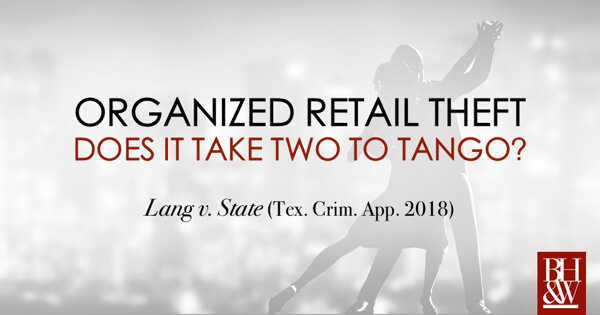
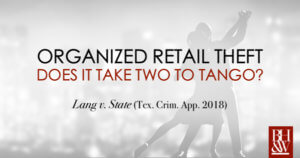 The Court of Criminal Appeals recently handed down an opinion on the applicability of Texas’ organized retail theft statute. The issue facing the court was whether the statute defining the offense of organized retail theft permits a conviction for ordinary shoplifting by a single actor rather than requiring a group or collaborative effort.
The Court of Criminal Appeals recently handed down an opinion on the applicability of Texas’ organized retail theft statute. The issue facing the court was whether the statute defining the offense of organized retail theft permits a conviction for ordinary shoplifting by a single actor rather than requiring a group or collaborative effort.
 The Court of Criminal Appeals recently handed down a case regarding a police officer’s findings of reasonable suspicion and probable cause. The issue was whether an officer had probable cause to arrest a customer for theft from a store before she actually exited the store and when she claimed, after being confronted by the officer, that she was going to pay for the items shad had placed in her purse.
The Court of Criminal Appeals recently handed down a case regarding a police officer’s findings of reasonable suspicion and probable cause. The issue was whether an officer had probable cause to arrest a customer for theft from a store before she actually exited the store and when she claimed, after being confronted by the officer, that she was going to pay for the items shad had placed in her purse.
 “Knock, knock!”
“Knock, knock!”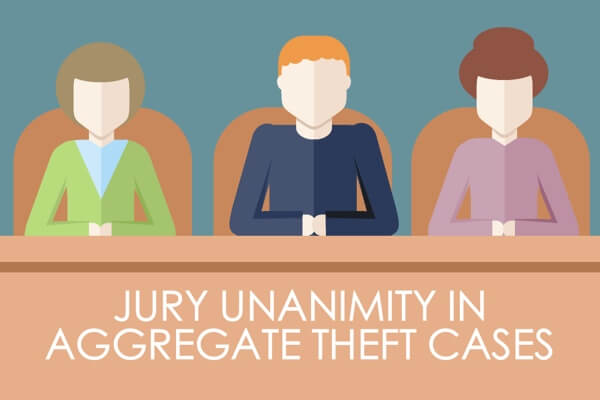
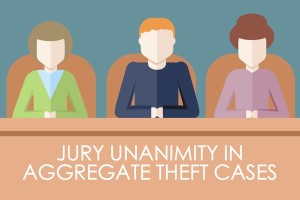 Jury unanimity is required in every jury trial, whether it be felony or misdemeanor. This means that the jury must unanimously agree that the State has proven or failed to prove all elements of an offense beyond a reasonable doubt. If a jury cannot reach a unanimous verdict of guilty or not guilty, then the judge will declare a mistrial. With some offenses, however, it can be a little unclear as to what jury unanimity actually requires. This is specifically so with aggregated theft cases.
Jury unanimity is required in every jury trial, whether it be felony or misdemeanor. This means that the jury must unanimously agree that the State has proven or failed to prove all elements of an offense beyond a reasonable doubt. If a jury cannot reach a unanimous verdict of guilty or not guilty, then the judge will declare a mistrial. With some offenses, however, it can be a little unclear as to what jury unanimity actually requires. This is specifically so with aggregated theft cases.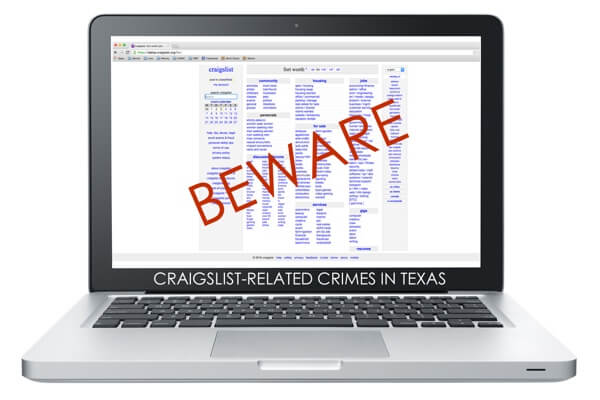
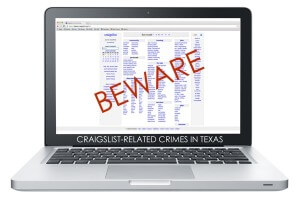 Gone are the days of flipping through your local newspaper’s classified section and circling your favorite ads. These days, Craigslist is the new classifieds of Fort Worth and Dallas. It is the one stop shop source to find a new car, truck, job, furniture, garage sale, or even a love interest. With the rise of Craigslist (and other online forums), there has also been an increase in criminal activity ranging from online scams to fraud and theft. Police stings based on advertisements from Craigslist are also common. Police have seen such a meteoric rise in these “Craigslist related crimes”, that many departments have established “safe exchange locations where transactions can occur under the watchful eye of local law enforcement.
Gone are the days of flipping through your local newspaper’s classified section and circling your favorite ads. These days, Craigslist is the new classifieds of Fort Worth and Dallas. It is the one stop shop source to find a new car, truck, job, furniture, garage sale, or even a love interest. With the rise of Craigslist (and other online forums), there has also been an increase in criminal activity ranging from online scams to fraud and theft. Police stings based on advertisements from Craigslist are also common. Police have seen such a meteoric rise in these “Craigslist related crimes”, that many departments have established “safe exchange locations where transactions can occur under the watchful eye of local law enforcement.
 Our firm has represented many defendants in Fort Worth with cases stemming from a bait car or a Backpage ad. For those of you not familiar with either, let me explain Bait Cars and Backpage.
Our firm has represented many defendants in Fort Worth with cases stemming from a bait car or a Backpage ad. For those of you not familiar with either, let me explain Bait Cars and Backpage.
 In
In 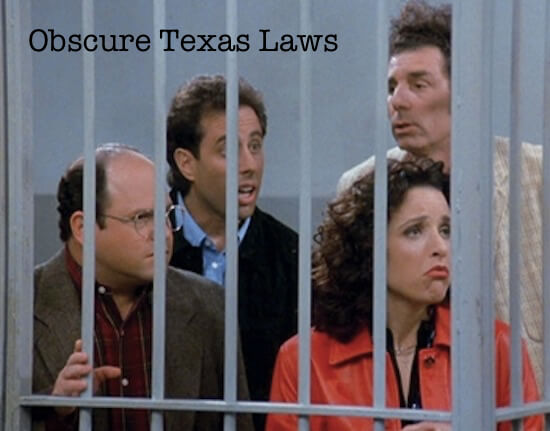
 No, I’m not talking about a Good Samaritan Law, but Texas does have some obscure laws on the books that you might not suspect. We are hoping to bring some of them to your attention. For the first obscure Texas law, we look to one of the most successful television shows in history.
No, I’m not talking about a Good Samaritan Law, but Texas does have some obscure laws on the books that you might not suspect. We are hoping to bring some of them to your attention. For the first obscure Texas law, we look to one of the most successful television shows in history.
 When a person is arrested for theft or shoplifting in Fort Worth and comes to consult with one of our Fort Worth criminal defense attorneys, one of the most common issues we’re asked about is what to do about a civil demand letter.
When a person is arrested for theft or shoplifting in Fort Worth and comes to consult with one of our Fort Worth criminal defense attorneys, one of the most common issues we’re asked about is what to do about a civil demand letter.





